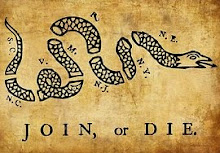The Establishment Protection Act
By John Tate-President of the Campaign for Liberty. He previously served as the National Political Director for The Ron Paul Presidential Campaign Committee.
"The so-called DISCLOSE Act currently under consideration in the Senate is an affront to personal liberties protected under the First and Ninth Amendments of the U.S. Constitution. This knee-jerk reaction to Citizens United v. FEC constitutes a clear and present danger not only to the expressly stated freedom of speech listed in the First Amendment , but to the reasonable expectation of privacy and freedom of association American citizens have held throughout this country’s proud history.
Thousands of non-profits and corporations are facing costly and burdensome administrative regulations from this legislation. This bill would force organizations to adopt needless layers of bureaucracy in order to comply with new FEC filing requirements. That will exponentially increase the operating costs for groups that otherwise have low overhead. Additionally, the forced "disclosure" in the "stand by your ad" requirement would consume 15 seconds or more of a 30-second TV spot. This requirement would cut down an organization's free speech—not to mention donors' free speech—by only allowing a group to talk about an issue for less than half of the valuable airtime they are paying for. Short, 15-second ads might have to be eliminated altogether.
The ambiguous nature of this legislation's language attempts to intimidate businesses and non-profits into not running any ads this November, for fear that they might somehow be violating federal election law by doing nothing more than talking about the issues. This bill blurs the distinction between express advocacy for a specific candidate and mere issue advocacy. Expressing support for an issue is not the same thing as expressly endorsing a candidate. This legislation does not make a distinction between the two, and, as a result, organizations running ads this November could face expensive lawsuits after the fact for allegedly violating some unwritten enforcement provision.
We call this legislation the Establishment Protection Act because that is exactly what it is intended to do. Politicians will do anything they can to avoid being held accountable to their constituents for their actions during the legislative season. Any organization that challenges the status quo will come under greater scrutiny than those that endorse the status quo—and that will make donors to such groups targets for harassment and intimidation. Donors will be less likely to give money to "controversial" issue advocates, resulting in a chilling of free speech. Fear and intimidation are simply incompatible with a free society and intolerable.
One of the main arguments made for this legislation during House debate was the claim that this bill would decrease the amount of money spent on elections. That is an outright falsehood. Nothing in this act would decrease the amount of money it costs to run for public office; rather, by restricting third-party fundraising and advertising it actually increases the amount a candidate would need to raise, thus again favoring incumbents who have a natural fundraising edge over challengers.
Senators Schumer, Feingold, and Leahy claim on their site: "When you buy toothpaste now, the money you spend can be used directly for television ads attacking people that you believe in without you even knowing." The senators provide no evidence to back up these claims; it appears they are quite paranoid about Colgate and Crest having a political axe to grind against them.
In today’s society, where congressional representation affords us one representative for roughly every 700,000 people, the only way for "We the People" to have a voice is by banding together under the umbrella of issue-advocacy organizations. For many individuals in America, the only way to give voice to their views is through contributing to advocacy organizations. By stifling the free speech of these organizations, Congress is stifling the free speech of the individual.
What part of "Congress shall make no law... " do they not get?"
Thursday, July 29, 2010
Subscribe to:
Post Comments (Atom)

No comments:
Post a Comment